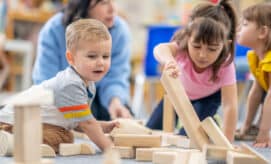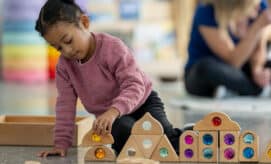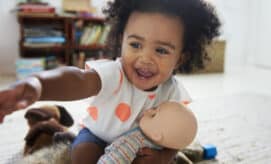Through play and exploration, young children develop a variety of foundational cognitive skills that they will continue to build upon as they get older. When it comes to social and relationship-building skills, for example, an important early developmental milestone is a child’s ability to understand that other people can have a perspective that is different from the child’s point of view. Children are said to be developing a theory of mind when they can recognize and think about the perspectives of others.
In this article, we explore theory of mind development in young children, and point to opportunities for early care & learning providers to support children’s ability to use perspective taking skills in their daily lives.
Understanding Theory of Mind & Its Importance
Put simply, theory of mind is the ability to think about the thoughts of others. An article from the Social Learning Lab at Stanford University describes theory of mind as, “…our unique ability to reason about what is going on inside other people’s minds, including what they want (desires), what they know (knowledge), and what they think is true based on their prior experience (beliefs).” The cognitive skills associated with theory of mind help children to understand and interpret behavior, develop social relationships, and empathize with others. These skills are crucial to the formation of friendships with peers during childhood, and into adulthood.
How Theory of Mind Develops in Early Childhood
Theory of mind develops in children gradually, most notably between the ages of 3 and 6 years old. Starting as early as infancy, however, children experience the early foundations of a theory of mind, as they observe the behavior of others and enjoy interacting with their adult caregivers.
A research paper published in The Encyclopedia on Child Development explains, “Theory of mind develops gradually, with intuitive social skills appearing in infancy and then reflective social cognition developing during the toddler and preschool years. Three-year-olds know that different people may want, like and feel different things. By age 4 or 5, children know that people may think different things. They understand that sometimes a person might believe something that is not true, but, in that case, what the person does or says is based on the false belief.” Some important milestones in theory of mind development, as cited in the paper above, include…
- Infancy: During infancy, babies are able to observe a person and have some basic insight into what they might be experiencing. Between 12-15 months, little ones can understand that different people can like different things.
- Toddlerhood: By age 2, toddlers understand that people will feel happy if they get what they want and feel sad if they do not. They also become aware that there can be a difference between what they want and what others want.
- Preschool age: When they are around 3 years old, children start to talk about other people’s thoughts, such as what they think and know. At around age 4, children begin to have the important realization that the thoughts in their minds are not always true.
Supporting Theory of Mind Development in ECE Classrooms
Opportunities for children to practice theory of mind skills can be incorporated into early learning classrooms during playful experiences and through social interactions with peers and adult caregivers.
Encourage Dramatic Play
Dramatic play encourages perspective-taking, as young children imagine what life would be like as another person. An article from the Child Mind Institute, written by psychologist Kathryn L. Keough, PhD, explains, “Pretend play…provides opportunities for children to build and practice social skills. Children who engage in more frequent and higher-level pretend play have been found to have more advanced understandings of others’ mental states, or theory-of-mind.”
Dramatic play and other types of imaginary play offer little ones a chance to step into someone else’s shoes and to think about what that person might think and feel. When they explore the experiences and feelings of others through play, children tap into empathy, a component of theory of mind and an important contributor to ongoing social and emotional development.
Read Books Together
Children’s stories are filled with opportunities to introduce perspective-taking to young children. As you read together, talk with the children about what the characters in the book might be thinking or feeling. You can support the child’s ability to empathize and feel connected by asking whether they’ve ever had thoughts and feelings similar to the character’s experience. Wordless picture books can be particularly beneficial for these kinds of conversations, because children can create their own stories, based on the images and the characters’ facial expressions.
Invite Conversations about Different Perspectives
Conversations with children about different people’s likes, dislikes, beliefs, and opinions, give little ones a chance to practice perspective-taking. For example, during snack time, you might say something like, “Ashley is eating blueberries. She really likes blueberries, but Jason doesn’t like blueberries so he’s not having any with his snack. Does anyone else like blueberries? Does anyone else not like blueberries?”
Another way to engage little ones is by responding with language about perspectives and feelings when children express their feelings to us. We can acknowledge the child’s point of view while introducing language that refers to the variety of perspectives that are possible. For example, if a child says, “I don’t want to take a nap,” we might respond with, “You’re not ready to take a nap right now. Some of your friends are ready to rest, but you don’t want to. That can feel frustrating.” These conversations help children feel heard and cared for, as they learn to understand and describe differences in feelings and opinions.





